|
|
|
Sort Order |
|
|
|
Items / Page
|
|
|
|
|
|
|
| Srl | Item |
| 1 |
ID:
081476
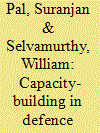

|
|
|
| 2 |
ID:
089343
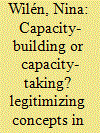

|
|
|
|
|
| Publication |
2009.
|
| Summary/Abstract |
This article critically analyses capacity-building and local ownership in the context of UN peace operations through interviews with UN staff and NGO representatives in Liberia and Burundi. The argument is that these concepts are left ambiguous and undefined to avoid accountability for peace operations while still functioning as value-adding and legitimizing discursive instruments for the latter. This article proves that the many paradoxes and contradictions surrounding the concepts clearly deter their operation in practice, while their positive connotations remain important, discursively, as legitimizing tools.
|
|
|
|
|
|
|
|
|
|
|
|
|
|
|
|
| 3 |
ID:
080702
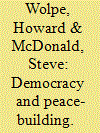

|
|
|
|
|
| Publication |
2008.
|
| Summary/Abstract |
This article, which is a systematic analysis of the practical experiences of the authors in facilitating workshops to help resolve African conflicts, argues that we need to think again about how we both conceptualize and operationalize peace-building techniques. As the Iraq debacle may be said to show, to impose a peace settlement and democratic government institutions on a state and people after a war does not, by itself, work. What is needed is a much deeper understanding by the parties to the conflict that they have shared interests, a common vision and must learn to work in collaboration with one another. In their work in Burundi, the Democratic Republic of Congo and Liberia, the authors and their team have developed new training techniques that are based on experiential learning. They organize workshops that bring key leaders together in a long-term process designed to resolve the tensions and mistrust that are the inevitable by-product of conflict and war, and to build (or rebuild) their capacity to work effectively together across all of the country's lines of ethnic and political division. Through the teaching of concepts such as 'interest-based negotiation' they aim to develop better real communication between the parties and to enhance collaborative capacity that will help build really solid personal and institutional relationships and lasting peace.
|
|
|
|
|
|
|
|
|
|
|
|
|
|
|
|
| 4 |
ID:
173915
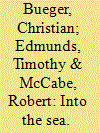

|
|
|
|
|
| Summary/Abstract |
Maritime security capacity-building is a growing field of international activity. It is an area that requires further study, as a field in its own right, but also as an archetype to develop insights for capacity-building and security sector reform in other arenas. This article is one of the first to analyse this field of activity. Our empirical focus is on the Western Indian Ocean (WIO) region. Here, international actors have launched multiple capacity-building projects, initially in response to Somali piracy. We document the significance, extent and variety of capacity-building activities in this region and examine the ways in which capacity-building at sea has incorporated innovative characteristics that develop and expand the capacity-building agenda as traditionally understood. Our conclusion highlights the need to pay more attention to the maritime domain in international security and development studies and considers ways in which the maritime capacity-building experience may offer important lessons for other fields of international policy.
|
|
|
|
|
|
|
|
|
|
|
|
|
|
|
|
| 5 |
ID:
104593
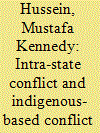

|
|
|
| 6 |
ID:
161365
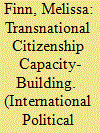

|
|
|
|
|
| Summary/Abstract |
Challenging statist understandings of citizenship neglectful of their own ironies, we explore the literature on circulation to argue that political actors build citizenship capacities through the transfer of various technologies, ideas, and modes of organization and by enhancing self-understanding across and within borders. This work is largely conceptual. Although we focus on transnational activist engagement with and within the Middle East, the theoretical linkages we make here can be extended to other social and political actors that operate within and across multiple geographical locales. To make our case, we briefly examine the importance of transnational circulation for citizenship capacity-building through a review of the relevant literature and then discuss how theories related to liminality and rhizomatic action can move the theoretical discussion in new directions. Our central argument is that the circular flow of people, political ideas, and tools across nation-state borders—including activists’ affinities, identifications, loyalties, animosities, and hostilities—are transforming contemporary social and political relations, including how people see themselves as citizens and build civic capacities in others. Political actors who act purposefully in various sites and scales of struggle are transforming how political subjectivity and citizenship are negotiated, claimed, justified, and legitimated regardless of citizenship status.
|
|
|
|
|
|
|
|
|
|
|
|
|
|
|
|
|
|
|
|
|